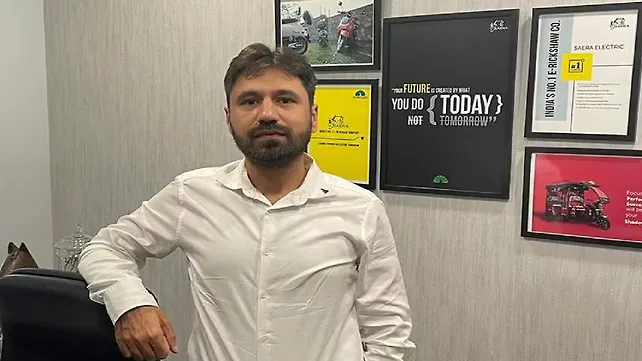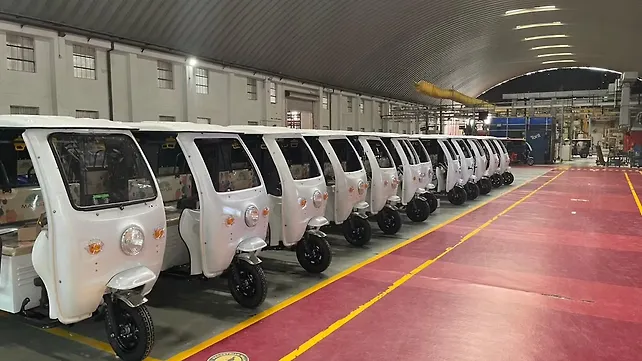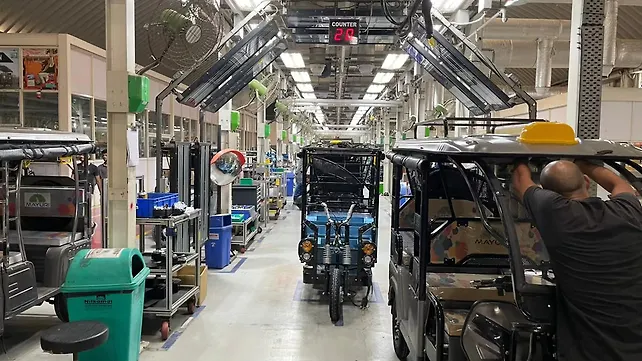
Superbikes and e-rickshaws have no connection! The former is meant for motorcycle enthusiasts who love to tour different terrains, while the latter is generally regarded as the medium of last-mile connectivity. But who says e-rickshaws cannot be manufactured in a plant where Harley Davidson used to manufacture superbikes for the Indian market?
Saera Electric Auto Pvt. Ltd. (SEAPL), better known as the Mayuri E-rickshaws brand in India, took over Harley Davidson's Bawal (Haryana) plant last year and plans to manufacture e-rickshaws as well as high and low-speed electric bikes at the plant.
In a conversation with Mobility Outlook, Nitin Kapoor, Managing Director, SEAPL, revealed that his organisation had sold over 100,000 e-rickshaws so far. The company had sold 14,000 of these last fiscal.
SEAPL is entering the business of retailing electric three-wheeler cargo and passenger auto-rickshaws this fiscal year. While the company has not finalised the prices for the upcoming launches, Kapoor noted that he expects the electric auto-rickshaws to be priced somewhere between INR 425,000 to INR 460,000. No brownie points for guessing that these electric autos will be manufactured at a facility where Harley Davidson once used to manufacture superbikes.
Lead-acid To Lithium-ion Leap
Foraying into the electric autos space simply means that SEAPL is taking a leap from lead-acid battery technology to lithium-ion technology. However, this does not state that SEAPL will stop manufacturing lead-acid-powered EVs.
'We will continue to make lead-acid powered e-rickshaws but the majority of electric autos will come powered by lithium-ion batteries. We also plan to introduce high-speed electric two-wheelers in India this year,' noted Kapoor.
Tapping the last mile connectivity market was one main reason SEAPL entered the e-rickshaw market. The electric-rickshaw market, as per Kapoor, has a lot of juice left in its batteries. SEAPL had posted revenue of INR 146 crore during FY22. The company has forecast the revenue figures to jump INR 300 crore during FY23.

SEAPL is entering the electric autos market at a time when electric three-wheelers have become the poster boy of EV adoption in India. The sales of electric three-wheelers, for the first time, have surpassed the sales of ICE three-wheelers in the country. Not to forget that the commercial vehicle space is the vertical that is leading the sales. Accordingly, the company expects that most of its electric auto sales will occur in the cargo sector. Kapoor shared that SEAPL already has secured orders from some logistics companies; however, he did not reveal any names.
'We plan to start manufacturing only 500 electric autos in the beginning. Our capacity is to manufacture over 200,000 per year but we will be taking it slow and steady as Lithium-ion is something we want to be sure about in terms of safety. SEAPL does not want to put people's life at stake by rushing its products to the market,' noted Kapoor.
Three Manufacturing Locations
The company currently manufactures its products at three plants, one each in Bhiwadi (Rajasthan), Bawal (Haryana) and Kosi (Uttar Pradesh). ICAT is currently testing its upcoming eclectic autos.
The company's electric autos will come featuring battery swap abilities. It has tied up with SUN Mobility and some other battery swap providers to enable its autos with battery swap and stationary battery charging capabilities. A policy on battery swap by the Government is also expected to hit the markets soon.
Interestingly, while the company's forecast points out that it expects most of its electric autos to be sold in the cargo and logistics segment, its electric rickshaws have been majorly selling in the passenger segment. Kapoor shared that out of every 100 electric rickshaws it sells in India, 50 are sold in Tier-1 cities, and the remaining are sold in Tier-2/34 cities.

“It is interesting that our target audience for electric autos is a little different from electric rickshaws. We expect the majority of our auto rickshaws to sell in Tier-2 and Tier-3 cities,” pointed out Kapoor.
Kapoor expects to sell more electric autos on the cargo and logistics side because SEAPL will be introducing these with a payload capacity of 800 to 1,000 Kg. “We expect 100% growth year-on-year,” he said.
Its upcoming passenger electric auto will be offered with a seating capacity of up to six people. Most of the EV OEMs currently sell passenger electric autos with a seating capacity of up to three people.
The company also believes that apart from cargo electric autos, it will also be able to sell approximately 6,000 cargo electric rickshaws this year. The electric vehicle cargo segment is indeed picking up pace in the country. (Read Report Here).
“I believe the electric vehicle industry, especially the two-wheeler and the three-wheeler, has the potential to replace the ICE vehicles completely by 2026. The Government of India is doing some work on this front, and we are now awaiting the final battery swap policy to be launched,” concluded Kapoor.